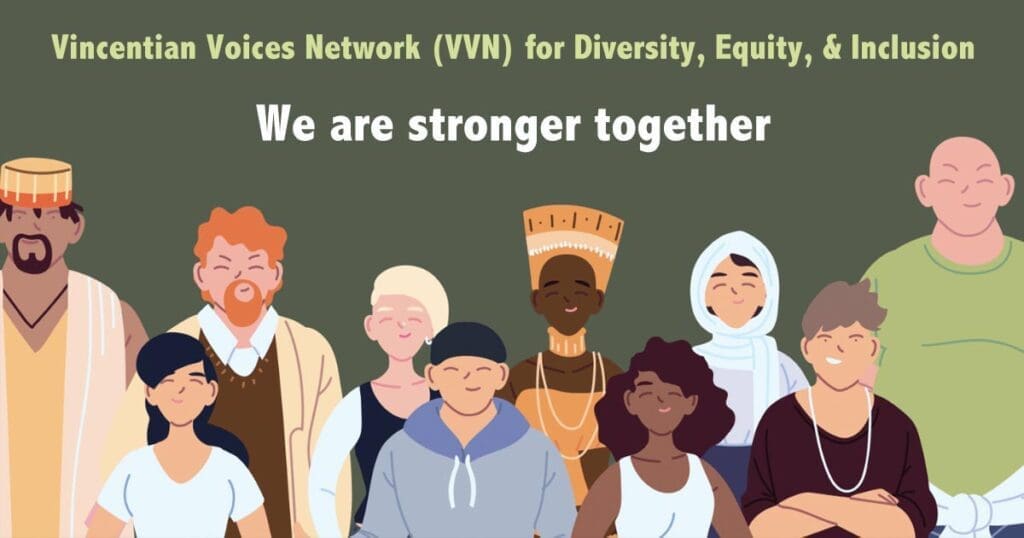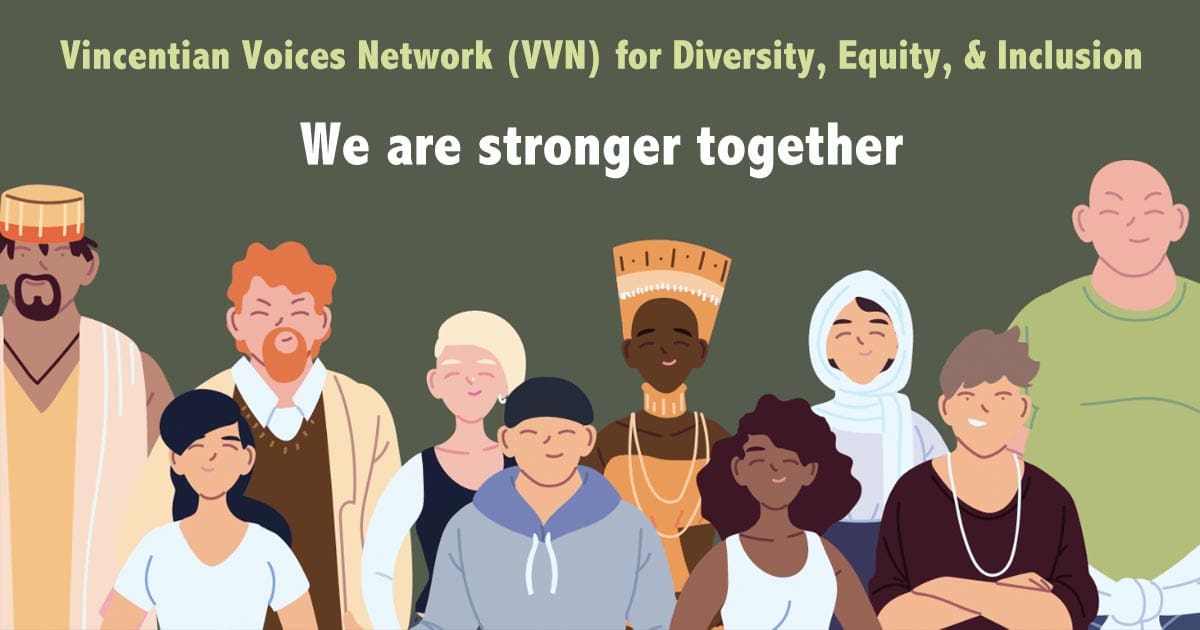Vincentian Voices Network: Diversity, Equity, and Inclusion (DEI)
What is white privilege? This is a term we have all heard but it can be difficult to understand if you are a Caucasian middle-class person, or especially if you are struggling within the cycle of poverty. You may hear some individuals say they have no special privileges and in fact don’t get the same opportunities that some people of colour enjoy due to their racial or cultural heritage.

I think one simple way to explain white privilege is a scenario a friend of mine used as she spoke with a white associate. She simply asked what do you think would happen if our two sons (one white, one Hispanic) were driving together when they were stopped by police for an infraction. Would the white son and Hispanic son receive identical treatment form the police? Perhaps yes, but not likely. The meaning of this example is that by simply being born white, a person will likely receive a different treatment in many instances.
What is systemic racism? This too can be a confusing term to the average white person who has likely never or seldom displayed any form of open racism or bias. What must be understood is the historical dominance of the white population in many countries, especially in the “new world” of North and South America. When the dominant white government makes and enforces the laws of the land and control of most levels of power such as the courts and policing, they have created a system that is inherently racist. It follows that the white population is part of this system and even if you do not approve of some systemic racism, if you are white, you are part of the system.
This can be similar to unconscious racism which can occur when a white person makes a remark or takes an action that they are unaware of being racist or hurtful to others. How can we prevent this from happening? The white population can seek to educate themselves about various culture and customs. They can seek to befriend people of colour. Open a dialogue with them and celebrate our many rich cultures we have in our various homelands. Unconscious racism can be overcome with a conscious effort to address it.
The biggest challenge we face today is not hatred but indifference.
You are also welcome to join our Facebook page.
About the author:
 Jim Paddon lives in London, Ontario, Canada and is a Canadian Vincentian. He is married to his dear wife Pat and they have six daughters and eleven grandchildren. Jim has been a member of the Society since the 1970’s.
Jim Paddon lives in London, Ontario, Canada and is a Canadian Vincentian. He is married to his dear wife Pat and they have six daughters and eleven grandchildren. Jim has been a member of the Society since the 1970’s.
I respectfully acknowledge the traditional, unceded territories of the Indigenous Peoples, including First Nations, Metis and Inuit, on which lands we meet, work and live.







Thoughtful comments. Thank you
We are blessed at SSVP with your wordsmithing.
Funny the SVDP founders and even the national presidents all look like white privilege.
This narrative simply promotes hatred toward whites and claims all blacks are victims
A wealth of data collected in a longform Quillette analysis, shows overwhelming white underachievement relative to several minority groups among health outcomes, educational achievement, incarceration rates and economic success. According to median household income statistics from the US Census Bureau, several minority groups substantially out-earn whites. These groups include Pakistani Americans, Lebanese Americans, South African Americans, Filipino Americans, Sri Lankan Americans and Iranian Americans. Indians are the highest-earning ethnic group the census keeps track of, with almost double the household median income of whites. Black immigrant groups such as Nigerians, Barbadians, Ghanaians and Trinidadians & Tobagonians have a median household income well above the American average. Though they make up less than 1 percent of the black population in America, nearly 25 percent of the black student body at Harvard Business School in 2013 consisted of Nigerians. In post-bachelor education, 61 percent of Nigerian Americans over the age of 25 hold a graduate degree compared to only 32 percent for the US-born population.The issue is not skin color, but the culture. These facts challenge the prevailing progressive notion that America’s institutions are built to universally favor whites and “oppress” minorities or blacks. On the whole, whatever “systemic racism” exists appears to be incredibly ineffectual, or even nonexistent, given the multitude of groups who consistently eclipse whites.
Quit being a tool to spread hatred.
Thank you Dan for your comments. I cannot dispute the data you have gathered but would offer some further comments. Perhaps the data regarding incomes for newcomers to North America is because they come from countries that have a culture without the level of discrimination we have in North America.
I would respectfully suggest you move away from data only to having actual dialogue with North Americans who have experienced systemic racism. I also recall a friend of mine who moved from an African nation to a large midwestern USA city. She said she had no idea what systemic racism looked like until she experienced it in this city. The biggest challenge we face today is not hatred, it is indifference.